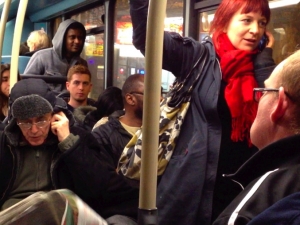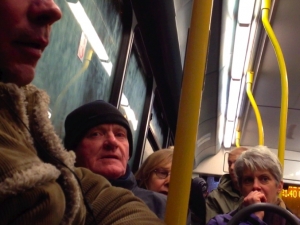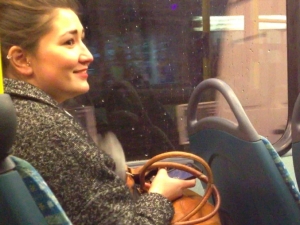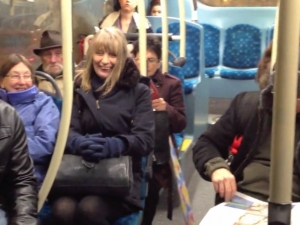Laurence Payot and Nathan Jones presented this intervention on buses in Liverpool on 4th December.
An experimental language performance delivered via the medium of the overheard phone conversation....
Three people board a bus. One by one, their phones ring and they answer them. Their speech, although having the intonation and address of a conversation, is freakish and absurd, containing a hybrid of the emotive, the mundane, the political and philosophical with what appears to be a kind of public-sector slang. Responses from passengers on the bus vary and fluctuate between annoyance, amusement, bewilderment and a contented acquiesence to this uncanny new reality. As the three conversations come together, a disjointed, but local and political imperative emerges and the three people alight at the next stop.
Here is a video of one of our actors, Matthew Smith, working with a text derived from Boys from the Blackstuff and contemporary conversation from Liverpool's Welsh Streets.
A new website will be the archive/notebook for The Quest, documenting a research-led project which envisages iteration, reversion and notation as exemplary artform. The site features original scores of notated speech direct from the streets of Liverpool, reference-points from the research and development phase, exploring the resonance of community issues around the disputed Welsh Streets site in L8 - including notation from the Boys from the Black Stuff tv series, and experimental texts exploring how these languages meshed with modern philosophies and poetry.
Along with these textual scores, the site features audio recordings made by actors from Liverpool Everyman proposing an installation for boarded up streets, and the current documentation from the buses intervention.
Combined in this way, we hope the project reveals the instance of the intervention as a productive act, and site for an ongoing process of re-imagining public participation in environment.
The work is the current iteration of an ongoing research and intervention project run by Mercy, supported by Arts Council England GFA, and a Cornerhouse Microcommission.








